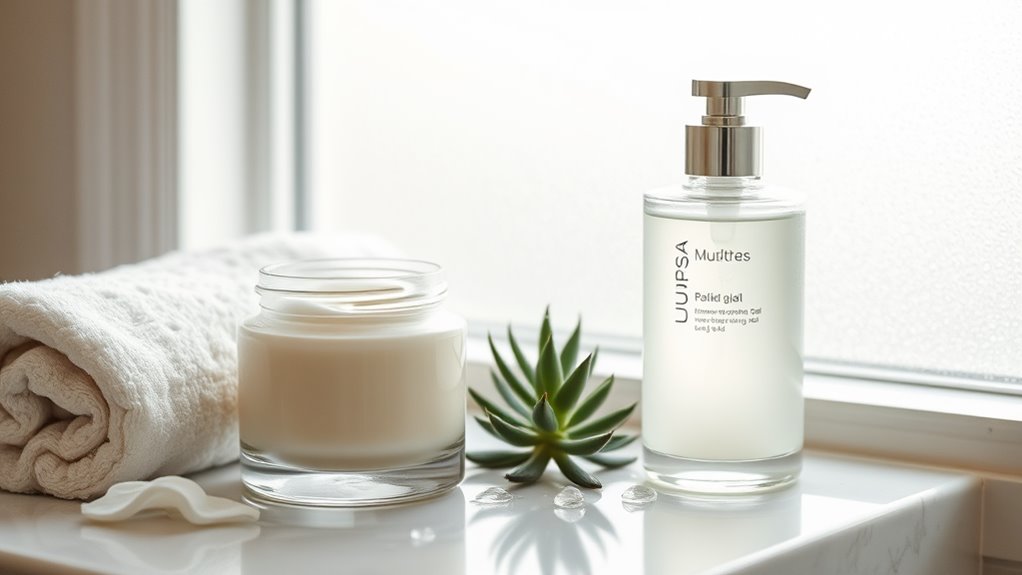Best Skincare Routine for Sensitive Skin Types
For the best skincare routine for sensitive skin types, start with a gentle cleanser to avoid irritation, then follow up with an alcohol-free toner featuring soothing ingredients like chamomile. Apply a lightweight, fragrance-free moisturizer on damp skin to lock in hydration. Don’t forget sun protection—use a broad-spectrum sunscreen daily. For specific concerns, incorporate calming serums and targeted treatments. Stick to this routine consistently to help your skin flourish, and there’s more to discover about tailoring it perfectly.
Key Takeaways
- Start with a gentle, hydrating cleanser to avoid irritation, cleansing twice daily with lukewarm water.
- Use an alcohol-free toner with soothing ingredients like chamomile or aloe vera to balance skin pH.
- Apply a lightweight, fragrance-free moisturizer on slightly damp skin to lock in hydration effectively.
- Incorporate calming serums and spot treatments with aloe vera for specific irritations or flare-ups.
- Always use broad-spectrum sunscreen daily to protect sensitive skin from UV damage, even on cloudy days.
Understanding Sensitive Skin
Sensitive skin affects many people, and it’s essential to recognize its unique characteristics. You might notice that your skin reacts strongly to various products, leading to redness, itching, or stinging.
This heightened sensitivity often stems from a compromised skin barrier, making it more susceptible to irritants and allergens. Understanding sensitive skin involves identifying triggers, such as certain ingredients in skincare, environmental factors, or even stress.
You’ll want to choose products that prioritize gentleness and hypoallergenic formulations to minimize reactions. Additionally, recognizing the signs of sensitivity—like dryness or irritation—can help you adapt your routine effectively.
Essential Cleansing Techniques
When it comes to caring for sensitive skin, choosing gentle cleansing products is essential.
You’ll want to master proper cleansing techniques and find the right frequency that works for your skin type.
Let’s explore how to effectively clean your skin without causing irritation.
Gentle Cleansing Products
Finding the right gentle cleansing products can make a world of difference for your skincare routine. Choosing the right cleanser is essential, especially for sensitive skin. Look for products with soothing ingredients that won’t strip your skin of its natural moisture. Here’s a quick comparison of some effective gentle cleansers:
| Product Name | Key Ingredient |
|---|---|
| CeraVe Hydrating Cleanser | Ceramides |
| La Roche-Posay Toleriane | Thermal Water |
| Vanicream Gentle Facial Cleanser | Glycerin |
| Neutrogena Ultra Gentle Cleanser | Aloe Vera |
Each of these options provides gentle cleansing without irritation. Incorporate them into your routine, and you’ll likely notice a calmer, more balanced complexion.
Proper Cleansing Techniques
Mastering proper cleansing techniques is essential for maintaining healthy skin, especially if you have delicate skin.
Start by using lukewarm water to avoid irritation; hot water can strip your skin’s natural oils. When applying your gentle cleanser, use your fingertips to massage it in circular motions, allowing it to work effectively without harsh scrubbing.
Rinse thoroughly, ensuring no residue remains, as leftover product can lead to breakouts or sensitivities. Pat your skin dry with a soft, clean towel—never rub.
Finally, follow up with your soothing toner or moisturizer to lock in hydration. Being mindful of these techniques won’t only enhance your cleansing ritual but also greatly improve your skin’s overall health and resilience.
Frequency of Cleansing
Cleansing your skin too frequently can actually do more harm than good, especially for sensitive skin. Over-cleansing strips your skin of its natural oils, leading to irritation and dryness.
Aim to cleanse your face twice a day—once in the morning and once at night. In the morning, a gentle cleanse removes overnight buildup, while an evening cleanse eliminates pollutants and makeup.
If you’ve exercised or sweated, consider an additional cleanse to refresh your skin, but choose a mild formula to avoid irritation.
Listen to your skin; if you notice redness or tightness, reduce your cleansing frequency. Mastering the balance of cleansing will enhance your skin’s resilience and overall health, creating a harmonious, glowing complexion.
Choosing the Right Toner
When choosing a toner for your sensitive skin, it’s vital to pay attention to the ingredients.
You’ll want to avoid any harsh additives and opt for alcohol-free formulations to prevent irritation.
Additionally, maintaining the right pH balance is essential to keep your skin healthy and comfortable.
Ingredients to Avoid
Choosing the right toner is essential for sensitive skin, especially since certain ingredients can trigger irritation.
Avoid toners that contain alcohol, as they can strip your skin of moisture and exacerbate sensitivity. Fragrances, whether synthetic or natural, are also best left out, as they often provoke allergic reactions.
Stay clear of harsh exfoliants like glycolic or salicylic acid in toners; these can disrupt your skin barrier and lead to redness. Additionally, be cautious with botanical extracts; while some may be beneficial, others can irritate.
Always read ingredient labels carefully, and when in doubt, opt for products specifically formulated for sensitive skin. Your skin deserves care that nurtures rather than aggravates.
Alcohol-Free Formulations
Finding the right toner for sensitive skin means prioritizing alcohol-free formulations. Alcohol can strip your skin of moisture, leading to irritation and discomfort.
Instead, look for toners infused with soothing ingredients like aloe vera, chamomile, or rose water. These components hydrate and calm your skin, enhancing its natural balance without the harsh effects of alcohol.
When choosing a toner, consider your skin’s specific needs. If you’re combating redness, opt for those with anti-inflammatory properties. For hydration, select water-based toners rich in antioxidants.
Always patch-test new products to verify compatibility. With the right alcohol-free toner, you can refine your skincare routine and maintain your skin’s health, allowing it to feel refreshed and rejuvenated without the risk of irritation.
Ph Balance Importance
Understanding pH balance is essential for selecting the right toner, especially for sensitive skin.
The pH scale ranges from 0 to 14, with 7 being neutral. For ideal skin health, you want to maintain a slightly acidic environment around 4.5 to 5.5.
Here’s what to look for in a toner:
-
pH Level: Verify it’s close to your skin’s natural acidity to avoid irritation.
-
Ingredients: Choose calming agents like chamomile or aloe vera to soothe your skin.
-
No Alcohol: Avoid toners with alcohol, which can strip and dry out sensitive skin.
-
Hydration: Look for humectants like glycerin to help retain moisture.
Moisturizing for Sensitive Skin
Moisturizing is essential for maintaining healthy skin, especially if you have sensitive skin that can easily react to various products.
Choose a moisturizer specifically formulated for sensitive skin; look for ingredients like hyaluronic acid, glycerin, and ceramides that provide hydration without irritation. Avoid fragrances, alcohol, and harsh chemicals that can exacerbate your skin’s sensitivity.
Apply your moisturizer while your skin is still slightly damp to lock in moisture effectively. Remember to use it both morning and night to maintain hydration levels throughout the day.
If you’re trying a new product, patch test it first to prevent adverse reactions. With consistent moisturizing, you’ll help strengthen your skin’s barrier, reducing redness and improving overall texture. Additionally, incorporating effective calming ingredients can further enhance your skin’s resilience against irritation.
Sun Protection Strategies
While you may think sun protection is only necessary on sunny days, it’s essential for sensitive skin year-round. Ultraviolet (UV) rays can wreak havoc on your skin, causing irritation and premature aging. To ensure you’re effectively protecting your skin, remember that inadequate sun protection is the number one skincare mistake accelerating premature aging.
Here are some sun protection strategies you should adopt:
-
Broad-Spectrum Sunscreen: Choose a mineral-based sunscreen with SPF 30 or higher, applying it daily, even when it’s cloudy.
-
Reapply Regularly: Don’t forget to reapply sunscreen every two hours, especially if you’re sweating or swimming.
-
Wear Protective Clothing: Use wide-brimmed hats and UV-blocking sunglasses to shield your face and eyes.
-
Seek Shade: Whenever possible, stay in the shade during peak sun hours (10 AM – 4 PM) to minimize exposure.
Targeted Treatments for Sensitivity
If your skin often reacts to products or environmental factors, targeted treatments can provide the relief you need. Look for calming serums that feature ingredients like chamomile or calendula, as they soothe irritation and reduce redness.
Incorporating a gentle, hydrating essence can also help restore your skin’s barrier, ensuring it stays resilient. For acute flare-ups, consider using a spot treatment containing aloe vera or zinc, which can quickly alleviate discomfort. Additionally, using pure aloe vera gel as an overnight treatment can transform your skin by reducing inflammation and fading blemishes.
Additionally, hydrocortisone creams can be effective for short-term use during severe reactions. Always patch-test new products before widespread application to minimize risks.
Ingredients to Avoid
Even with targeted treatments in your routine, it’s important to be mindful of what you apply to your skin.
Certain ingredients can exacerbate sensitivity, leading to irritation and discomfort. Here are four key ingredients you should avoid:
-
Fragrance – Synthetic fragrances can trigger allergic reactions and irritation.
-
Alcohol – High concentrations of alcohol can dry out your skin and strip its natural barrier.
-
Sulfates – These harsh cleansing agents can disrupt your skin’s pH balance and cause irritation.
-
BHA/AHA – While effective for some, these acids can be too harsh for sensitive skin types and lead to redness.
Building a Consistent Routine
Creating a consistent skincare routine is vital for managing sensitive skin, as it helps to stabilize your skin’s condition and improve its overall health.
Start by cleansing twice daily with a gentle, hydrating cleanser. Next, incorporate a soothing toner to balance your skin’s pH and prepare it for further treatment.
Follow with a targeted serum containing calming ingredients like chamomile or aloe vera to address specific concerns. Moisturize with a lightweight, fragrance-free cream to lock in hydration.
Don’t forget sunscreen during the day; it’s essential for protecting your skin. Additionally, consider incorporating dermatologist-approved products to enhance the effectiveness of your routine.
Finally, keep a journal to track your skin’s reactions and adjust your routine as needed. Consistency is key, so stick with your regimen and give your skin time to adapt and flourish.
Frequently Asked Questions
Can Diet Impact the Sensitivity of My Skin?
Yes, your diet can considerably impact your skin’s sensitivity. Consuming anti-inflammatory foods, staying hydrated, and avoiding allergens can help soothe irritations. Pay attention to how your body reacts to different foods for ideal skin health.
How Often Should I Exfoliate Sensitive Skin?
You should exfoliate sensitive skin about once a week. Over-exfoliating can cause irritation, so listen to your skin. If it feels raw or irritated, cut back and focus on gentle, hydrating products instead.
Are Natural Products Better for Sensitive Skin?
Natural products can be gentler on your skin, but it’s essential to test them first. Some ingredients might still irritate you. Always read labels and choose formulations specifically designed for sensitive skin to avoid reactions.
Can Stress Worsen My Skin Sensitivity?
Yes, stress can definitely worsen your skin sensitivity. When you’re stressed, your body produces hormones that can trigger inflammation and irritation, making your skin react more intensely. Managing stress is essential for maintaining healthy skin.
Is It Safe to Use Makeup on Sensitive Skin?
It’s generally safe to use makeup on sensitive skin, but you should choose hypoallergenic, fragrance-free products. Always patch test new items and prioritize ingredients that soothe rather than irritate to minimize potential reactions.





